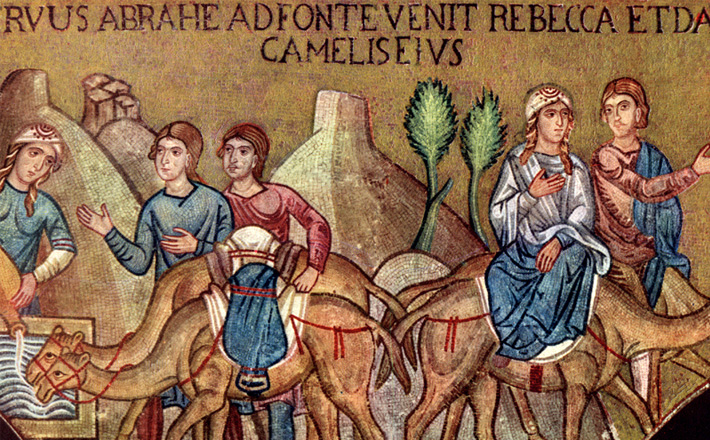Commentary on Romans 7:15-25a
Like last week’s reading from Romans 6:12-23, this week’s lesson from Romans 7: 15-25a features Paul’s teaching on the tension and struggle between life in the Spirit and life in the flesh.
In Romans 6, Paul summons believers to be what they have become, children of God; yet in Romans 7, he introduces a tension between the indicative and the imperative. These two consecutive lectionary readings signify the difficulty of embracing a faithful life and living out of a Christian identity. In other words, the question Paul raises is this: How can a Christian live an obedient life that becomes an expression of living faith? (Romans 7:14).
This passage sounds like a lament, one in which Paul sees himself and offers believers an open door in terms of the tension experienced by believers who struggle to live a righteous life in this world. The present tense “I” in this passage is hyperbolic, that is, an inability on the part of a believer to do right and an involuntary compulsion to do wrong (7:15-20). The struggle that Paul depicts in 7:14-25a resonates with many people in today’s culture, let alone in the ancient early Christian Church. Preachers must not minimize the struggle between the spiritual life and the body passions for to do so would be to render Christian life romantic.
Pious Jews lived with a strict observance of the law and were haunted by the fear of breaking any of the rules. Paul’s language fits the portrayal of individuals who struggled with some enslavement to passion and human desires. Similarly, pious Christians trying to observe strict rules of Christian life will also be struggling with issue of the flesh and the issues of the spirit (7:16, 22-23).
In Paul’s terms, one cannot have righteousness by simply observing the law, let alone Christian rules. Rather, righteousness must be accepted as a gift from God alone and human beings cannot boast in their observance of the law (see Romans 3:27, 4:2), but every Christian believer must operate under the framework of the spirit. The human mind is always threatened by the flesh and is made a prisoner if not a victim. Therefore, there is need for a ransom, and only God can do this. The anguished individual in this text cries out, “Wretched person that I am!” And this is a person needing deliverance from the body destined for death (7:24; 8:10).
The apostle’s “Thanks be to God,” seems to be the implied answer to the lament of the persona in 7:24. Christians must be reminded of the victory they have in Jesus Christ and a belief in this victory is the response of faith that Paul talks about in all his theological reflections. Paul treats this victory in Romans 8:1-17 where he teaches about the perspective of the Spirit that is always in conflict with the fleshy (8:5-7).
It is worth noting that Paul does not minimize the presence of the flesh in his life and neither should 21st-century Christians. Although we have come to believe in Jesus Christ, we still have the propensity to sin because our natural selves pull us towards things we do not want to do (7:21). Both sin and evil dwell in the believer, and it is one’s responsibility to live a faith-accountable life. Paul certainly believes that the human body can be used for both good and evil and with God’s spirit, the body cannot be subjected to sin because the power of the Holy Spirit is always at work to direct a person’s path. In some cases, we need to recognize that the tension we experience between flesh and the spirit allow us to live well balanced lives; tension breeds questions and theology is always about raising new questions.
The lessons we can draw from this chapter are several. First, as believers, we must avoid sinning and be led by the indwelling Spirit, which opens tremendous doors for all believers. In other words, a compromise is not an option because once one becomes a Christian, the mind and everything in him or her are controlled by the Spirit. The question we should wrestle with is this: What does it mean to be a Christian? The answer from this passage is that our mindset and attitude must be godly and everybody whose mind is controlled by the Spirit delights exceedingly in Jesus Christ.
Secondly, if God dwells in us, then we must allow him to control our lives and this means that we have a union/relationship with Jesus Christ. Thirdly, if we sin, the same Spirit of God who resurrected Jesus from the dead will indeed give our mortal bodies new life. Finally, we have to remember that there is no discipleship without a relationship with the Spirit of God and for believers to enjoy eternal life, they must be transformed in their thinking, attitude, and way of life.
This set of notes will not be complete without mentioning the Apostle Paul’s overarching theological thinking. In chapter 7, we encounter a theocentric, or God-centered, and an eschatological, or future-oriented, Paul. Paul emphasizes four main theological lessons for every Christian. First, he redirects our thinking to the importance of vindication that is the death, resurrection, and the second coming of Jesus when God will display His faithfulness to all the promises made to humanity.
The theme of universalism is built into Romans 7, and in it we recognize that God in Jesus Christ acted for all people, nations, sexes, genders, and races. Paul recognizes that human beings live with a dualistic worldview or of good and evil, and as an eschatological thinking theologian, he reminds Christians that the current era is under sin but the future era is under God. The last theme of imminence or the expectation that Jesus Christ will come any time to complete God’s work is one that is not welcomed much in North American Christianity because it threatens people’s comfort and materialism; this theme is embedded in chapter seven, especially verses 24-25 (see also 1 Thessalonians 4: 13-5:11).
Teachers and preachers must lift these themes of vindication (God will accomplish all His purposes), universalism (all human beings and existence and all creation is under God’s control), dualism (God’s purposes will not defeated but will eventually come to pass), and imminence (second or soon impending coming of Jesus Christ, and God will then accomplish His creation purposes).
In light of this chapter, Christians may want to ask the following: What does mean for us as we practice ministry in the 21st century? In other words, how can we live intentional lives, lives that matter in God’s purposes now and in the future resurrection? Answering this question will center Christian believers into authentic Christian life.


July 6, 2014